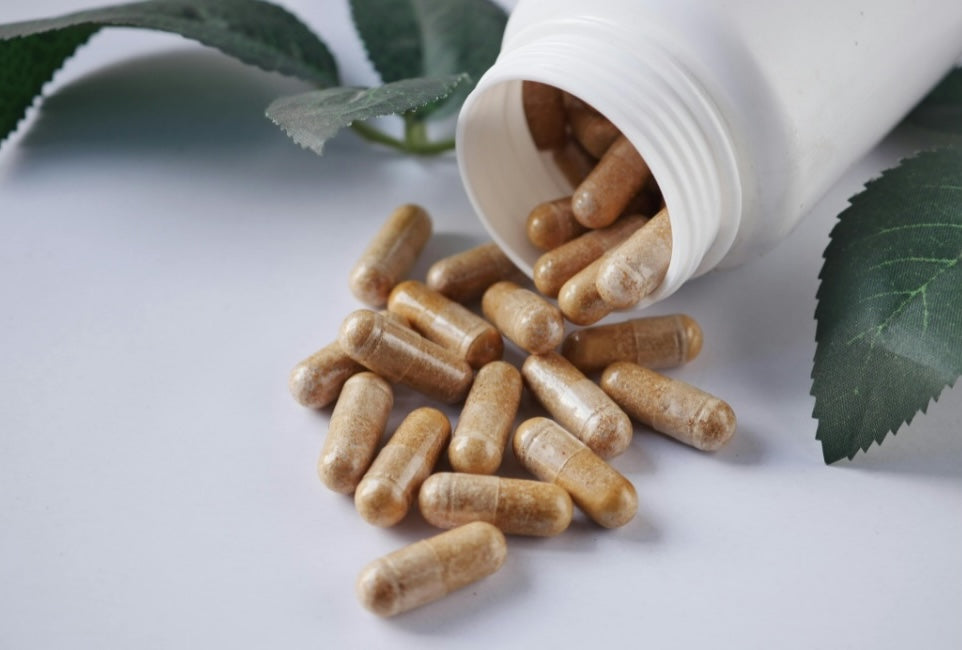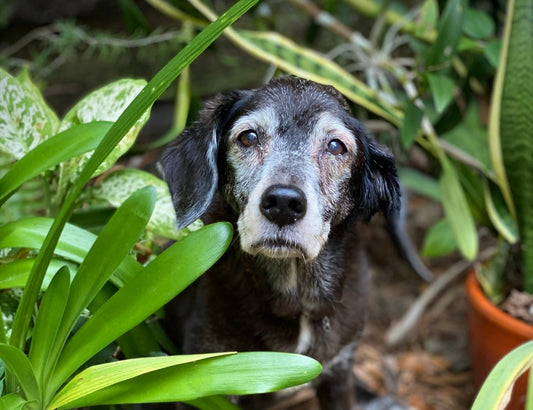If you’ve checked the label on your pet’s supplement—whether it’s a daily vitamin, mushroom blend, or herbal formula—you may have seen an ingredient called microcrystalline cellulose (MCC). Often disguised under names like cellulose gum or powdered cellulose, MCC is a highly processed filler made from wood pulp—technically plant-based, but indigestible and non-nutritive. For pets, especially those with sensitivities, it may interfere with digestion or nutrient absorption. So why is it in so many “natural” products? Let’s take a closer look.
What is Microcrystalline Cellulose?
Microcrystalline cellulose is a highly processed form of purified wood pulp. It’s made from plant fibers like cotton or hardwood trees and contains insoluble cellulose—the indigestible part of plant cell walls.
Supplement manufacturers often use MCC as a bulking agent in capsules, tablets, and powders. It’s cheap, odorless, tasteless, and approved by the FDA for use as a processing aid. But while MCC can make a product look full or feel smooth, it provides zero nutritional or therapeutic value for your dog.
Why MCC Shows Up in Pet Mushroom Supplements (and Why It Shouldn’t)
When you’re giving your dog a mushroom supplement, you’re likely doing so to support their immune health, vitality, or overall wellness. But just like with food, what’s in the formula matters—and so does what’s not.
Microcrystalline cellulose is a common additive in many powdered mushroom blends, capsules, and tablets for pets. It’s often added to improve texture, increase volume, or extend shelf life. But in reality, MCC offers no functional benefit and may actually interfere with your pet’s ability to absorb the active compounds in mushrooms.
How to Spot Microcrystalline Cellulose in Pet Supplements
If you see any of the following terms on the ingredient panel, you’re looking at synthetic filler:
* Microcrystalline Cellulose
* MCC
* Cellulose Gum
* Powdered Cellulose
* Cellulose Gel
These are all variations of the same inert, highly processed additive—one your pet doesn’t need.
Is Microcrystalline Cellulose Safe?
Microcrystalline cellulose is listed as “generally recognized as safe” (GRAS) by the FDA. But GRAS status doesn’t mean it’s ideal for everyday use—especially not in pets with sensitive digestion, inflammation, or chronic health issues.
Because MCC is not digestible, it passes through the body unchanged. But that doesn’t mean it’s harmless. Some research suggests MCC may irritate the gut lining, interfere with nutrient absorption, or disrupt the balance of beneficial microbes in the digestive tract.
And for pets already dealing with immune system challenges or sensitivities, even small amounts of synthetic filler can add to the body’s toxic burden.
Microcrystalline Cellulose Side Effects: What Pet Parents Should Know
Here are a few reasons to think twice about MCC in your pet’s supplement:
1. Gut Irritation
MCC is not a prebiotic and doesn’t support digestive health. In some pets, it may contribute to bloating, soft stool, or disruption of the gut microbiome—especially in those with existing sensitivities.
2. Increased Toxic Load
To make MCC suitable for supplements, it often undergoes chemical processing—raising concerns about residual solvents or heavy metals, especially in products not third-party tested.
3. Interference with Absorption
Functional mushroom compounds need to be absorbed efficiently to deliver their benefits. Fillers like MCC may bind to minerals or create a barrier that reduces bioavailability.
4. False Sense of Potency
Filler-heavy powders may appear full or potent, but much of what’s inside could be just bulk—not active ingredients.

Why I Created a Filler-Free Mushroom Supplement for Dogs
When I set out to create a functional mushroom supplement for my own dogs, I knew it had to be different.
Powders and capsules weren’t working. They were hard to measure, difficult to administer, and often full of fillers like MCC that did nothing to help. In some cases, they even made things worse—upsetting my dogs’ stomachs and reducing their appetite.
That’s why I created MycoDog, mushroom extracts for pets that are formulated differently:
No microcrystalline cellulose.
No synthetic additives.
No artificial flavors or preservatives.
Just clean, powerful mushrooms and adaptogens in an easy-to-use tincture your pet’s body can actually absorb.
What to Look for in a High-Quality Mushroom Supplement for Pets
If you're choosing a mushroom extract to support your dog’s wellness, here are a few things to look for:
Dual Extracted – Mushrooms are mostly water, and tinctures offer better bioavailability than powders. Look for dual extracts that preserve both the water- and alcohol-soluble compounds.
Fruiting Body Only – Avoid products made from myceliated grain. The most potent compounds are found in the fruiting body—the part of the mushroom you see growing above ground.
No Fillers or Binders – Skip any mushroom product with MCC, maltodextrin, flavorings, or other synthetic additives.
Natural Substrate – Mushrooms should be grown on wood or natural decaying matter—not rice or oats.
Grown & Extracted in the USA – Many overseas mushroom products are poorly regulated. Domestic, wild-harvested or naturally cultivated mushrooms offer better transparency and safety.
Adaptogens & Synergistic Herbs – Look for blends that include complementary botanicals like Ashwagandha to enhance benefits.
Preserved Naturally – MycoDog uses organic vegetable glycerin instead of alcohol to make its tinctures gentle, shelf-stable, and easy to administer.
Final Thoughts: Pet Mushroom Supplements Without Fillers
Functional mushrooms offer powerful support for your pet’s immune health, stress response, and overall vitality—but only if the product is clean, potent, and free from unnecessary fillers.
Microcrystalline cellulose has no place in mushroom supplements for dogs. It offers no benefit and may actually get in the way of the results you’re hoping to see.
When you choose MycoDog, you’re choosing a cleaner, more thoughtful approach—one designed to respect both ancient healing wisdom and modern science.
Because your pet deserves more than filler.
About Angela Ardolino

Angela Ardolino, a certified fungi clinician, brings over 20 years of expertise to the field of holistic pet wellness. She is a passionate advocate for safe, natural, and ethically-grown whole plant and fungi medicine tailored for pets.
Angela is the founder and formulator behind Hemp Dog Health and MycoDog, two pioneering brands that prioritize pet health through carefully crafted Full Spectrum Hemp for dogs, cats, and horses, as well as wild-harvested, dual-extracted mushrooms and adaptogens.
Committed to the highest standards, Angela continues to educate and inspire pet parents through her popular podcast, Your Natural Dog, where she hosts experts to discuss holistic pet care, natural remedies, nutrition, and training. Follow Angela Ardolino on her website, Facebook, TikTok, and YouTube to stay updated on her mission to educate and empower pet parents everywhere.




